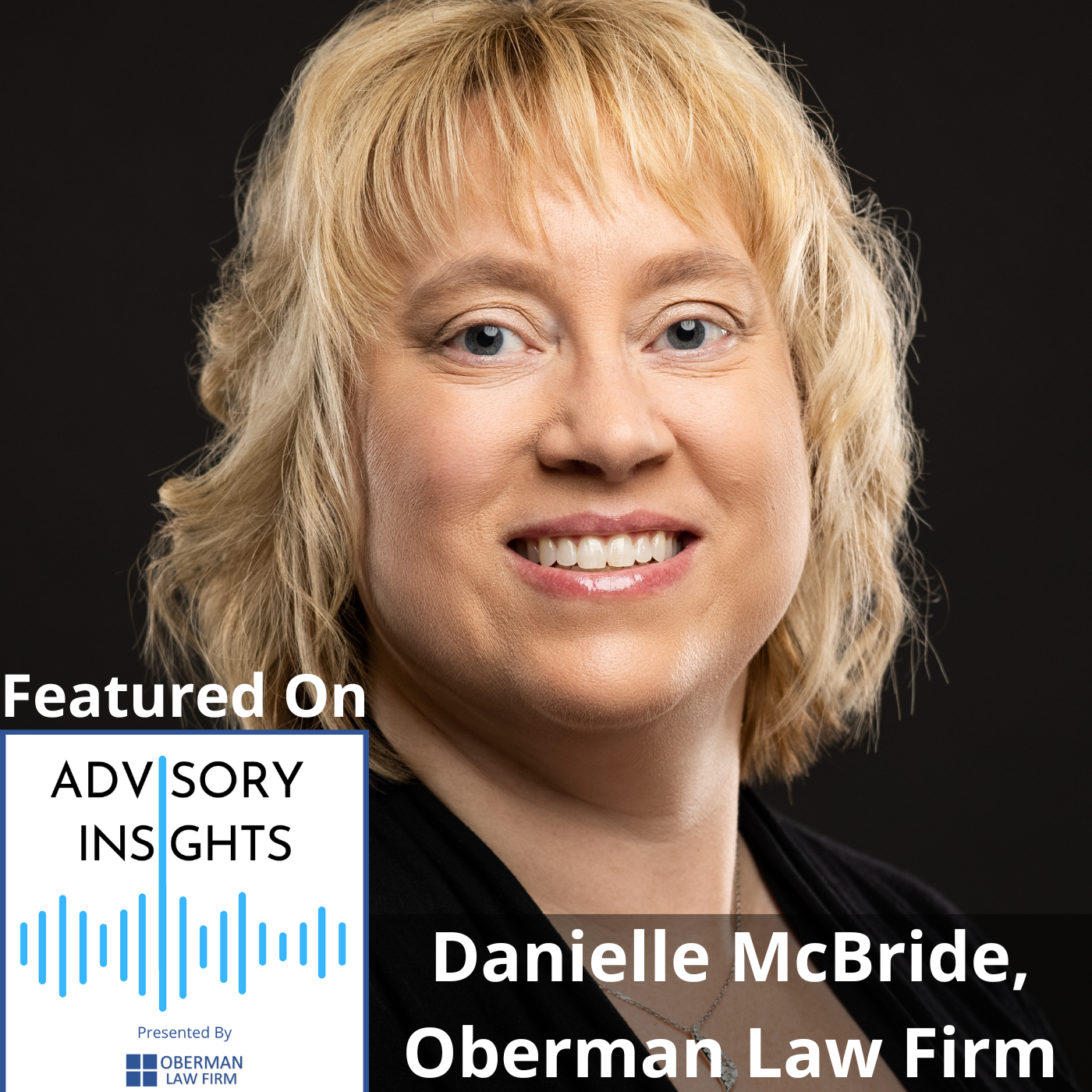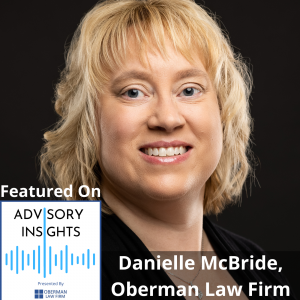
Tax Consequences of a Practice Sale (Advisory Insights Podcast, Episode 11)
On this episode of Advisory Insights, Stuart Oberman talked with Danielle McBride, Partner at Oberman Law Firm, on corporate sales transactions. She emphasized the importance of involving a CPA early in the transaction to ensure that the proper documentation is in place to avoid double taxation.
Advisory Insights is presented by Oberman Law Firm and produced by the North Fulton studio of Business RadioX®. The series can be found on all the major podcast apps. You can find the complete show archive here.
Danielle McBride, Partner, Oberman Law Firm

Danielle McBride has been practicing law for over 21 years, and her primary focus is representing healthcare clients on a local, regional, and national basis. Ms. McBride regularly consults with clients regarding simple to complex healthcare transitions, including mergers and acquisitions, employment law, governmental compliance, tax strategies, practice valuations, DSO formation and structures, employee compensation, associate and partnership contracts, joint ventures, and partnership buy-in/buy-outs.
In addition, Ms. McBride brings a wealth of knowledge and experience preparing practice valuations for clients, as well as formulating simple to complex tax strategies, and entity formations.
Ms. McBride holds a Bachelor of Arts in Sociology/Criminology from The Ohio State University, a Juris Doctor (J.D.) from Ohio Northern University Pettit College of Law, and a Master of Laws (LL.M.) in Taxation from Case Western Reserve University.
TRANSCRIPT
Intro: [00:00:01] Broadcasting from the studios of Business RadioX, it’s time for Advisory Insights. Brought to you by Oberman Law Firm, serving clients nationwide with tailored service and exceptional results. Now, here’s your host.
Stuart Oberman: [00:00:19] Welcome everyone to Advisory Insights. This is Stuart Oberman, Oberman Law Firm. Well, we have a fantastic guest with us today on our podcast, Danielle McBride, who is a partner in Oberman Law Firm, and who does an enormous amount of health care transactions on a national basis.
Stuart Oberman: [00:00:40] For those who are not familiar with our firm, we are very, very health care centered. Last year, we did 135 transactions, and I believe the number was, maybe, about 350 million was total of the transactions. So, through this craze that we’re in, mergers and acquisitions, the tax consequences are so under viewed that they got to get out in the forefront of these issues.
Stuart Oberman: [00:01:14] And Danielle McBride, who does a fabulous job with the firm, and who is our resident tax guru, if you will, and has a master’s in tax is really going to walk us through some things. And I got some questions along the way that she’ll answer, hopefully. And this is such an ongoing topic. We can talk about tax consequences for a day and not even cover everything on a merger and acquisition. So, Danielle, welcome to the show again.
Danielle McBride: [00:01:44] Thanks, Stuart. Good to be here and happy to put some information out there so our buyers and sellers can be a little more educated on these topics.
Stuart Oberman: [00:01:51] Yeah, it’s amazing. It is amazing how many questions you receive and we all receive on these deals and how uninformed some advisors are. And I want you to touch on that later on during the podcast. But, you know, I want to talk about some of the things you run into on the sales tax side, you’ve got goodwill, you’ve got personal versus corporate, you’ve got C versus S corporations, you’ve got reporting issues. I know, again, it’s a long, long, long conversation we can have on this. And I know you’ll drill it down to the basics, which will not cover all the details. So, tell us, I want to know what you’re running into on some of these sales.
Danielle McBride: [00:02:39] Sure. So, you know, basic tax consequences, I think a lot of that information is out there. You’ve got a sale of tangible assets, a sale of goodwill, capital gain on goodwill, tax treatment is ordinary income on the sale of tangible assets. But it gets much more complicated and there can be a lot more detail involved depending on the type of entity that someone has.
Danielle McBride: [00:03:03] So, if your seller is, say, a C Corporation versus an S Corporation or an LLC, a C Corporation has an entity level tax. It’s not a pass through entity, which means that there is a tax on the sale of any assets from the corporation first. And then, you’ve got your shareholders receiving distributions of the balance of that. And so, there could be a goodwill double taxation issue if your corporation owns the goodwill and sells it. So, that’s where personal goodwill is kind of a key component.
Danielle McBride: [00:03:42] And most important in these C Corporation sales, and we still have a lot of older C Corporations that are out there in the health care world, so you want to make sure that you’re looking at that. Not only C Corporations but S Corporations. If a C Corporation elected S Corporation status, they have a five year window during which they still get treated if they sell assets like they’re a C Corporation. They call it a built-in gains tax.
Danielle McBride: [00:04:14] So, you’ve got to be aware if you’re a C Corporation or a C that elected S status and you haven’t met your five year built-in gains tax window, personal goodwill in those cases is just key because you’re going to avoid a double taxation issue if you set up the transaction properly using personal goodwill instead of having the corporation own and sell all of the assets.
Stuart Oberman: [00:04:39] That’s a good point.
Danielle McBride: [00:04:39] So, it could be a huge tax difference here. And so, that’s something you got to talk to your advisors about, make sure that it’s being structured properly, make sure your contracts have those things specifically listed in it, and the sellers are listed as both personal seller selling personal goodwill and corporations selling the assets.
Danielle McBride: [00:05:03] And then, that even goes down to payments as well. Make sure if you’re getting personal goodwill and it’s a key component in this C Corporation or what we call sort of a non-ripe S Corporation. You know, the payment and all of the documentation needs to track in order to protect that personal goodwill concept and keep you from paying twice on the goodwill.
Stuart Oberman: [00:05:28] A non-write election corporation?
Danielle McBride: [00:05:32] Non-ripe.
Stuart Oberman: [00:05:33] Ripe. Okay.
Danielle McBride: [00:05:34] We call it a non-ripe S election when you’ve elected S Corporation status and you have that five year building gains tax window that you have to meet.
Stuart Oberman: [00:05:44] You just mentioned a couple of things. Do you write in cases where the CPAs, one, don’t understand transactions, or, two, they don’t get involved early enough?
Danielle McBride: [00:05:57] Yeah, absolutely. And the latter is what I see most often. The clients are hesitant to get their accountants involved early in the transaction, and I think that’s one of the biggest mistakes that I see made is not involving that CPA. And there are lots of good CPAs out there that understand and work in these dental transactions. And they just need to be looped in and they need to help talk about personal versus corporate goodwill. If there are tax attributes that the corporation could use some things allocated to corporate goodwill versus personal goodwill, because they’ve got corporate tax attributes to use up.
Danielle McBride: [00:06:44] I mean, the CPA is in a position to know these things, and they’re also the first line of defense if a transaction gets audited. So, they need to be involved from the beginning. And everybody needs to be on the same page. So, I always say, practice transitions, practice sales, business sales, they’re a team sport. And you need to have all your team players on the field when you’re trying to work through these things.
Stuart Oberman: [00:07:12] I don’t know, some transactions are a blood sport. I don’t know about a team sport.
Danielle McBride: [00:07:18] That’s when we get the corporate transactions involved and it gets more complicated because –
Stuart Oberman: [00:07:22] And I know you run into this, when everyone is ready to quit the deal, I mean, everyone’s like, “I’m done with this. I can’t do this anymore. I’m sick of this. I’m done. We’re about one day away from finalizing the deal, aren’t we?” It’s just gets to that stage.
Stuart Oberman: [00:07:37] Now, you also mentioned a couple of things. You mentioned, you know, at the end of the transaction, there’s got to be a true up of allocations that have to be reported to the IRS. How important is that and what form is that?
Danielle McBride: [00:07:51] That is very important, and it’s often overlooked, and most clients don’t understand this, and don’t know anything about it as well. It’s a Form 8594. So, in a sale transaction, you have to report the transaction to the IRS. That gets done on a Form 8594. That should be prepared by the accountants. Another reason accountants need looped into this, because they’re the ones that ultimately prepare that Form 8594 to submit to the IRS.
Danielle McBride: [00:08:21] So, in the documents, it’s important to have the price allocation spelled out so that the accountants can properly report this, because it’s the same as if you accidentally forget to report that you got a 1099 or a W-2 from an employer, you’re going to wind up audited because the IRS gets reporting from both sides of a transaction. So, if you don’t submit an 8594 or you submit one that’s different than the other party, it’s going to flag you for an audit.
Stuart Oberman: [00:08:54] Now, I got one question that we’ve run into on occasion. What happens if the buyer wants to set a floating sales price that is spread out through the years where, let’s say, they say if you hit this target, this is a sale price. And that may go on for two or three years. How complex is that and how problematic is that for the seller who doesn’t know what in the world to do with this taxes?
Danielle McBride: [00:09:21] Yeah. So, that is also a reason to have your accountant involved because there are certain ways that you can report that. And that may get reported as an installment sale. And those numbers, you don’t want to report it on that initial tax form that goes in because you may or may not receive those amounts. Those amounts could be treated as an installment sale, and you don’t get taxed until you actually receive the funds.
Stuart Oberman: [00:09:45] Oh, wow. Okay. So, that sounds like another podcast. I mean, it truly is amazing. You know, in this brief, brief segment that you’ve touched on, you’ve touched on corporate goodwill, personal versus corporate, C versus S Corporation, reporting 8594, and you’ve touched on installment sales. I mean, it is truly amazing what has to be done on a tax side from a sale, whether it is a small sale or $44 million sale, which we’ve handled on a transaction.
Stuart Oberman: [00:10:27] I say we could talk seven days on topics. But in closing, is there anything you’d want to add advice that we can give our listeners on what they want to do before they start getting into the meat of this transaction or a transaction?
Danielle McBride: [00:10:49] Well, make sure you reach out to your advisors. If you’ve got letters of intent, make sure you show those to your advisors and go through those. Make sure you’re thinking about the structure and the tax allocations. And make sure you understand the terms of the deal, you know, things like personal versus corporate goodwill. Another thing we didn’t even touch on that I see as a big issue is accounts receivable and how that’s going to be handled.
Stuart Oberman: [00:11:17] There’s another podcast. You’re making a career out of this.
Danielle McBride: [00:11:20] Yeah. You’re going to keep me on this.
Stuart Oberman: [00:11:24] We’re going to have the Danielle McBride show here in a minute. They’re going to give me the hook. You’ve already teed up seven episodes here. It’s like a version of a Game of Thrones, geez. Well, again, it is amazing and you’ve done an amazing job since joining the firm. We’re so happy to have you. You bring so much gravitas to the table. Again, we’re definitely going to have you back on this show.
Stuart Oberman: [00:11:53] So, in parting, if you need to reach Danielle, please feel free to email her at danielle, D-A-N-I-E-L-L-E, @obermannlaw.com. The phone number 770-886-2400. Folks, it’s been an absolute pleasure and we hope that you’ve at least taken away one golden nugget of this. And if so, we’ll consider this podcast an absolute success. Danielle, thank you again. I know you’ve got a convention to go to. And we appreciate your time. Thanks a lot. Ladies and gentlemen, thanks and have a fantastic day.
Outro: [00:12:30] Thank you for joining us on Advisory Insights. This show is brought to you by Oberman Law Firm, a business-centric law firm representing local, regional, and national clients in a wide range of practice areas, including health care, mergers and acquisitions, corporate transactions, and regulatory compliance.
About Advisory Insights Podcast
Presented by Oberman Law Firm, Advisory Insights Podcast covers legal, business, HR, and other topics of vital concern to healthcare practices and other business owners. This show series can be found here as well as on all the major podcast apps.
Stuart Oberman, Oberman Law Firm

Stuart Oberman, Founder, Oberman Law Firm
Stuart Oberman is the founder and President of Oberman Law Firm. Mr. Oberman graduated from Urbana University and received his law degree from John Marshall Law School. Mr. Oberman has been practicing law for over 25 years, and before going into private practice, Mr. Oberman was in-house counsel for a Fortune 500 Company. Mr. Oberman is widely regarded as the go-to attorney in the area of Dental Law, which includes DSO formation, corporate business structures, mergers and acquisitions, regulatory compliance, advertising regulations, HIPAA, Compliance, and employment law regulations that affect dental practices.
In addition, Mr. Oberman’s expertise in the healthcare industry includes advising clients in the complex regulatory landscape as it relates to telehealth and telemedicine, including compliance of corporate structures, third-party reimbursement, contract negotiations, technology, health care fraud, and abuse law (Anti-Kickback Statute and the State Law), professional liability risk management, federal and state regulations.
As the long-term care industry evolves, Mr. Oberman has the knowledge and experience to guide clients in the long-term care sector with respect to corporate and regulatory matters, assisted living facilities, continuing care retirement communities (CCRCs). In addition, Mr. Oberman’s practice also focuses on health care facility acquisitions and other changes of ownership, as well as related licensure and Medicare/Medicaid certification matters, CCRC registrations, long-term care/skilled nursing facility management, operating agreements, assisted living licensure matters, and health care joint ventures.
In addition to his expertise in the health care industry, Mr. Oberman has a nationwide practice that focuses on all facets of contractual disputes, including corporate governance, fiduciary duty, trade secrets, unfair competition, covenants not to compete, trademark and copyright infringement, fraud, and deceptive trade practices, and other business-related matters. Mr. Oberman also represents clients throughout the United States in a wide range of practice areas, including mergers & acquisitions, partnership agreements, commercial real estate, entity formation, employment law, commercial leasing, intellectual property, and HIPAA/OSHA compliance.
Mr. Oberman is a national lecturer and has published articles in the U.S. and Canada.
Oberman Law Firm
Oberman Law Firm has a long history of civic service, noted national, regional, and local clients, and stands among the Southeast’s eminent and fast-growing full-service law firms. Oberman Law Firm’s areas of practice include Business Planning, Commercial & Technology Transactions, Corporate, Employment & Labor, Estate Planning, Health Care, Intellectual Property, Litigation, Privacy & Data Security, and Real Estate.
By meeting their client’s goals and becoming a trusted partner and advocate for our clients, their attorneys are recognized as legal go-getters who provide value-added service. Their attorneys understand that in a rapidly changing legal market, clients have new expectations, constantly evolving choices, and operate in an environment of heightened reputational and commercial risk.
Oberman Law Firm’s strength is its ability to solve complex legal problems by collaborating across borders and practice areas.
Connect with Oberman Law Firm:
Company website | LinkedIn | Twitter
















